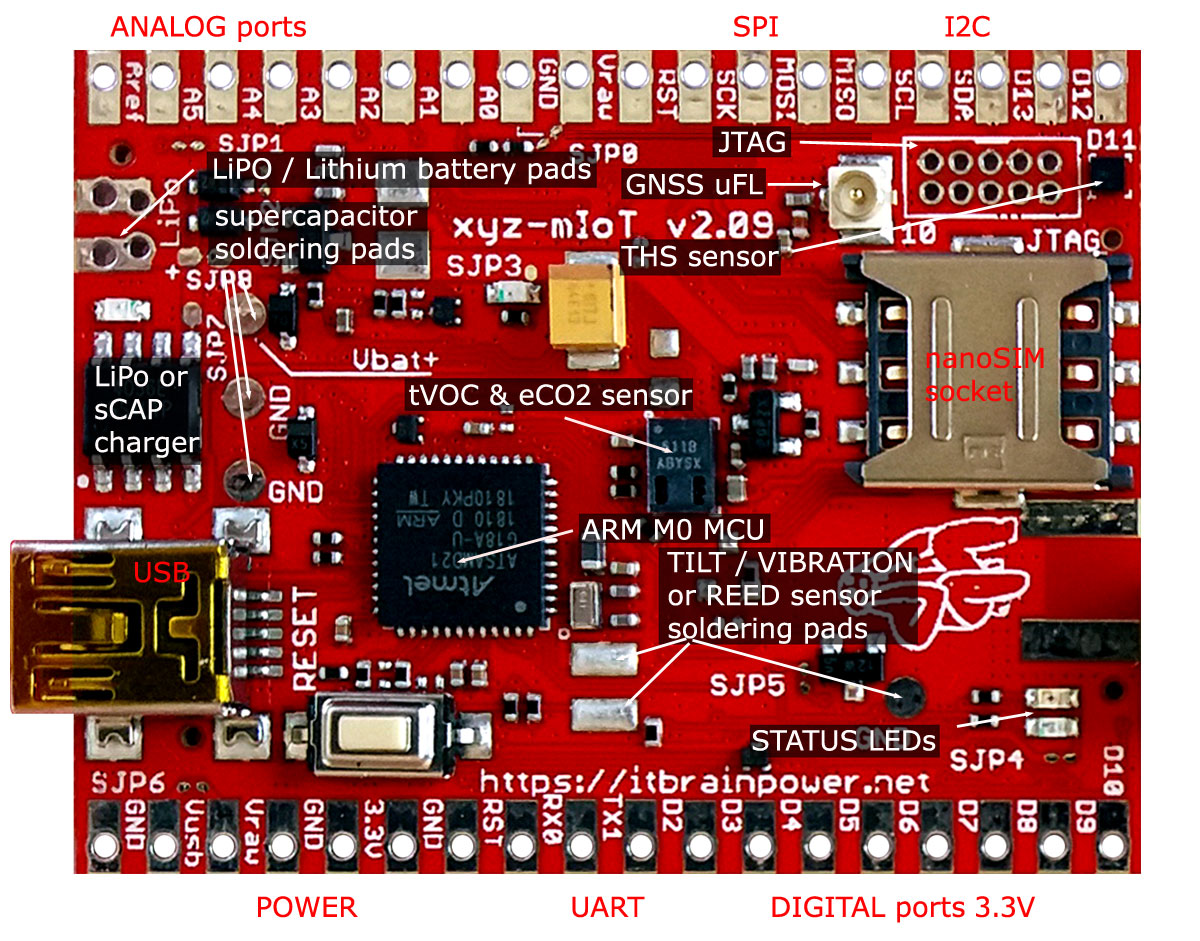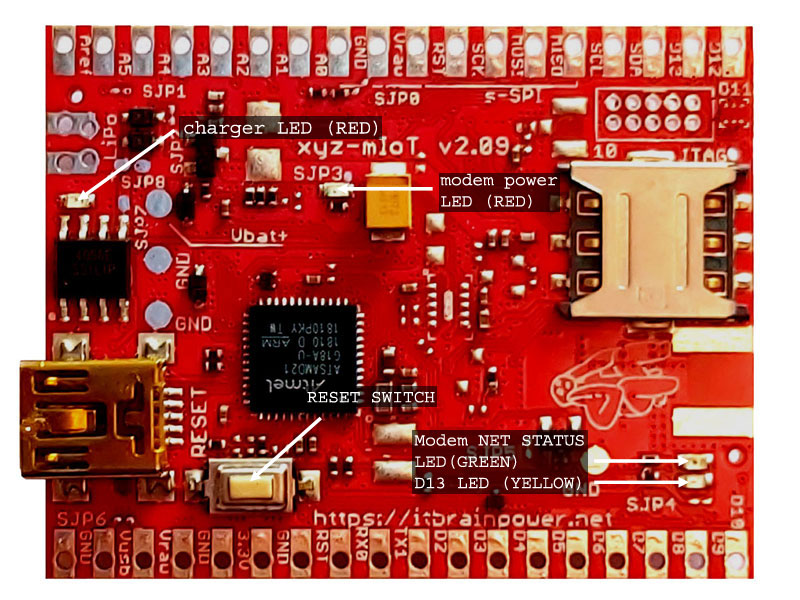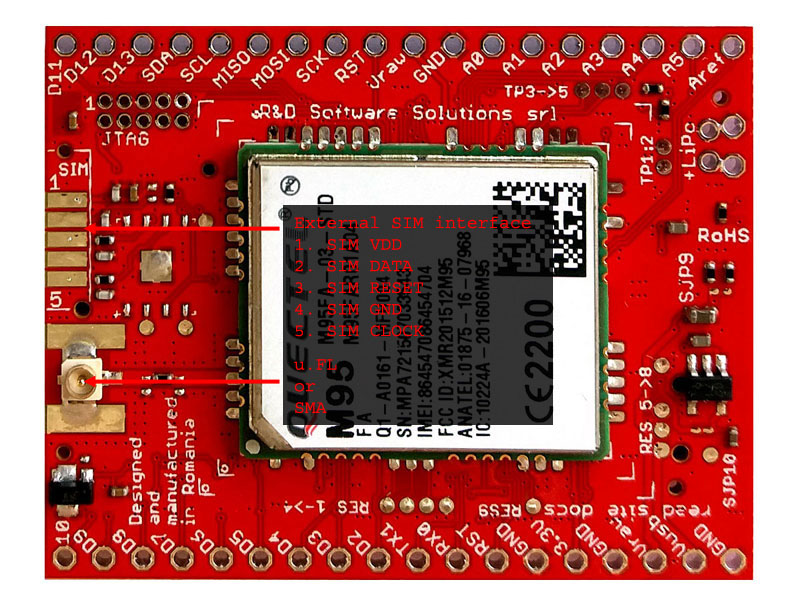itbrainpower.netxyz-mIoT equipped w. M95FA modem ** low power ARM0 IoT shield
|
|
xyz-mIoT equipped with M95FA modem :: FEATURES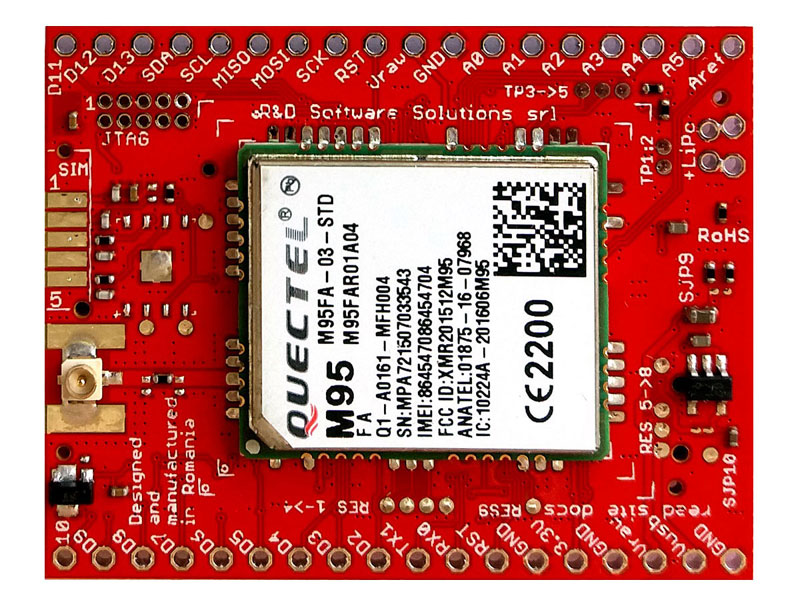
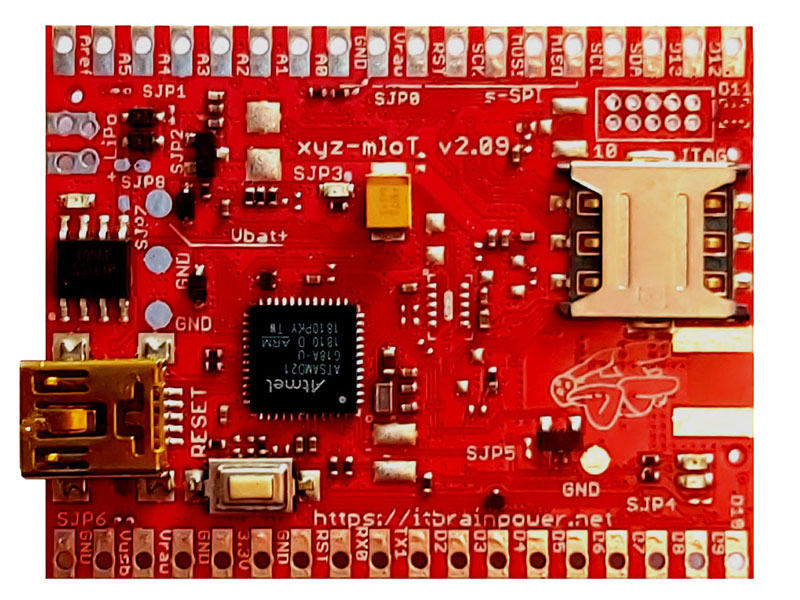
|
|
| | |
| | |
xyz-mIoT equipped with M95FA modem :: INTERFACES, PADS / PORTS and CONNECTORS
PADS / PORTSRight image: bottom PCB with component identification*. PADS & PORTS allocation information here. More accurate info should be obtain by consulting xyz-mIoT block schema. Keep in mind that available components and features are PN dependent, check this. * GNSS feature is NOT available for this variant! |
|
|
LEDs, RESET SWITCH and additional info1. RESET SWITCH - RESET/PROGRAMMING functions* 2. GREEN LED - network status LED 3. YELLOW LED - D13 - ARDUINO system LED 4. RED LED (left) - battery charger LED 5. RED LED (center) - modem power LED * enable programming mode - push RESET twice (fast) * reset shield - push RESET button only once - on right side - nano SIM socket connector - on left side - LiPO battery PADS (LiPO+/Vbat and GND) - on left side - USB mini B connector |
|
|
External SIM CARD port, antenna connectorExternal SIM card interface 1. SIM VDD 2. SIM DATA 3. SIM RESET 4. SIM GND 5. SIM CLOCK - if not used, leave them not connected - if used, in order to avoid interferences, keep the wires as short as possible and take in to account the routing. GSM side antenna connector xyz-mIoT shield may be ordered with u.FL connector or with SMA F connector. Check PN and options here. |
|
| | |
| | |
xyz-mIoT equipped with M95FA modem :: ARDUINO libraries, EXAMPLES and UTILITIES
Resources marked with "#", requires for download the following information: your name, email address and the modem IMEI. The modem IMEI can be found printed on the Quectel GSM module, or run AT+GMGS command. xyz-mIoT equipped with M95FA modem :: DOCUMENTATION DOWNLOAD/ONLINEThe xyz-mIoT shield documentation can be found here. xyz-mIoT equipped with M95FA modem :: ARDUINO PROJECTSGETTING STARTED posts containing xyz-mIoT by itbrainpower.net powering, low power / solar cell powering tips and tricks and interfacing guidelines for GSM / low power modems, ethernet, WIFI, LORA, SD card reader, TFT displays, sensors, relays and other modules, together with CLOUD integration examples can be found in projects section. |
|
xyz-mIoT equipped with M95FA modem :: ORDER ONLINEVariants having onboard LiPO/LiION battery charger and embedded sensors:- xyz-mIoT w. M95FA, CCS811 (CO2 and TVOC), HDC2010(THS), DRV5032(HALL) and uFL connector >> ITBP-4007 - xyz-mIoT w. M95FA, HDC2010(THS), DRV5032(HALL) and uFL connector >> ITBP-4008 Variants having onboard LiPO/LiION battery charger, no sensors embedded: - xyz-mIoT w. M95FA and uFL connector >> ITBP-4009 | |
xyz-mIoT equipped with M95FA modem :: ORDER FROM OUR DISTRIBUTORSChoose and order from one distributor near you. | |
|
xyz-mIoT variants equipped with other modem: xyz-mIoT equipped w. C16QS modem [LTE CAT1.bis, European], xyz-mIoT equipped w. BG95 modem [LTE CATM / NB IoT + GNSS], xyz-mIoT equipped w. BC95G modem [NBIOT], xyz-mIoT equipped w. BG96 modem [LTE CATM1 / NBIOT / eGPRS + GNSS], xyz-mIoT equipped w. EG91E modem [LTE CAT1 / 3G / 2G, European], xyz-mIoT equipped w. EG95A modem [LTE CAT4 / 3G, N. American] and xyz-mIoT basic [no modem] | |
the alphabet : order online a-gsmII shield [new] b-gsmgnss shield [new] a-gsm shield c-uGSM shield (micro) d-u3G shield (micro) f-audioOutputs adapter g-SPS boards i-hatGSM3G adapter j-328GSM3GLader adapter h-nanoGSM shield (nano) l-LTE shield s-Sense sensor breakout boards [HOT] u-GSM shield - CAT M1 / NB IoT / LTE [newest] xyz-mIoT integrated sensors IOT shield [newest] IoT product of week featured product [STRATUM1 NTP server] DOWNLOADS FAQs |
|
|
Security, automation, monitoring, IoT and special purpose equipments: STRATUM 1 NTP server GNSS syncronized SMS gateway with parallel processing Temp., hum. and more monitor w. SMS alarm Development kits: LTE CATM + NB IoT development kit(s) Arduino and Raspberry PI how-to and tutorials hottest project newest project newest hardware how to newest software tutorial view all tutorials BME688 Arduino how to CCS811 Arduino how to HDC2010 Arduino how to BME680 Arduino how to BME280 Arduino how to BMP280 Arduino how to CCS811 RPI how to HDC2010 RPI how to BME680 RPI how to BME280 RPI how to BMP280 RPI how to Covid19 related resources: ZOOM speaker (w. Arduino shield and a-gsmII) - covid19 response help for elderly peoples PARP purified air flow controller for 12VDC blowers powered from 5V LiION power bank temperature, humidity and pressure sensor temperature and pressure sensor BME280 Arduino how to BMP280 Arduino how to BME280 RPI how to BMP280 RPI how to our environmental and air quality sensor breakouts: OPT3002 BME688 CCS811 + HDC2010 combo BME680 CCS811 BME280 BMP280 HDC2010 |
|
|
distributors
contact
privacy policy
terms and conditions |
|
| document version 1.3 / 2025-05-28 | © R&D Software Solutions srl |
